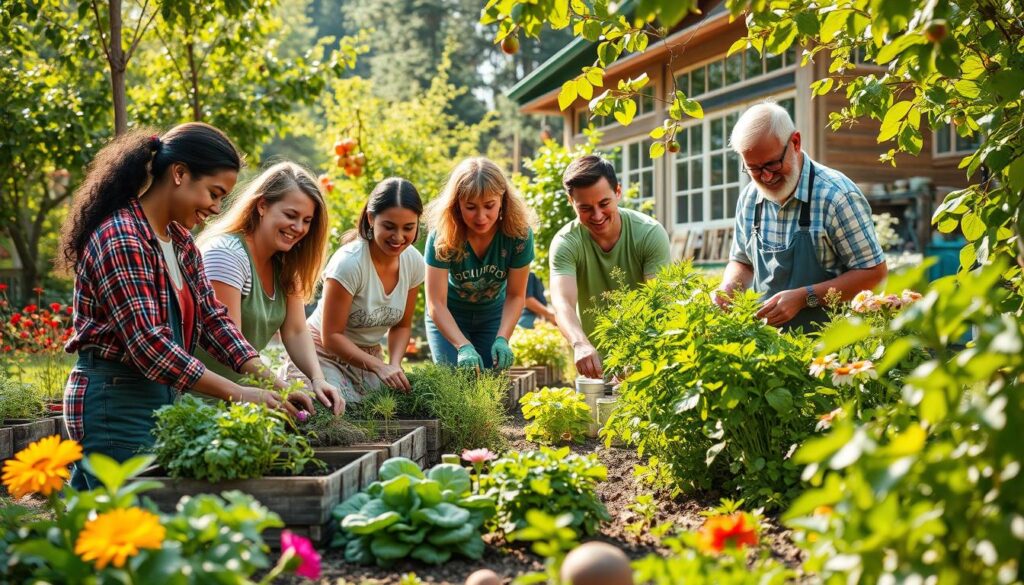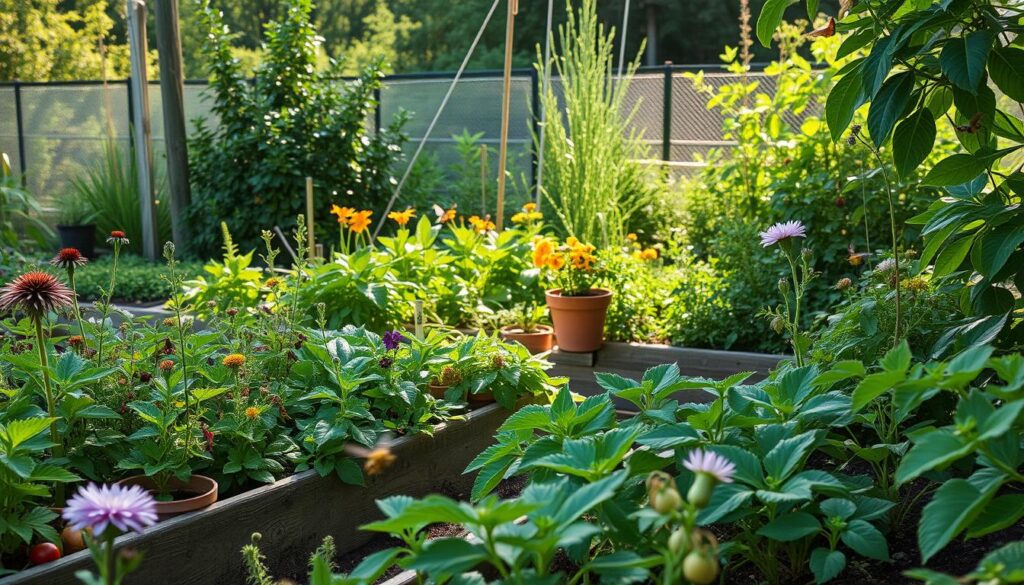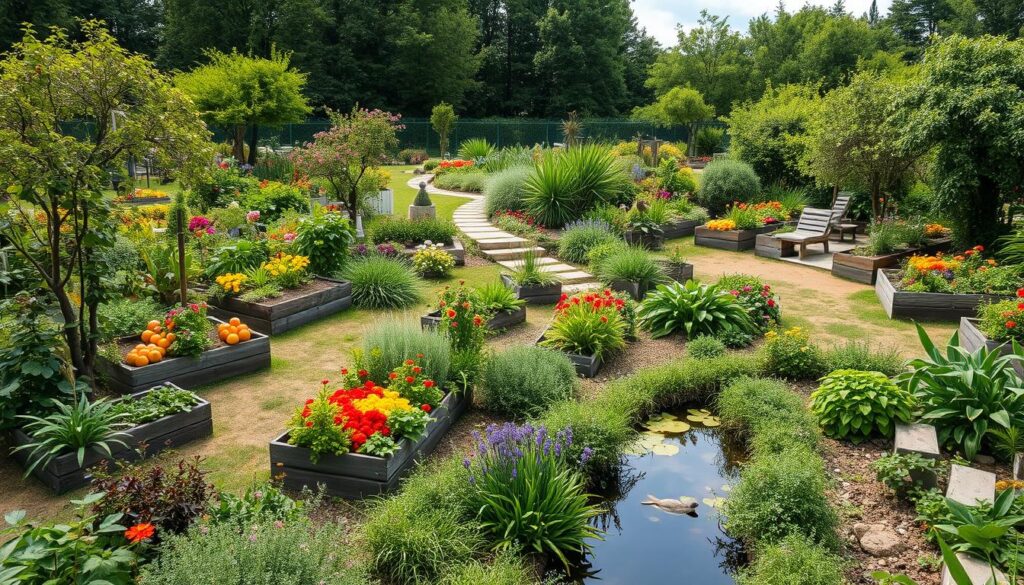The concrete jungle of modern life often leaves us feeling disconnected and overwhelmed. My own journey through stress and burnout led me to discover a transformative approach: permaculture for mental health. Imagine healing not just yourself, but the environment around you simultaneously.
Permaculture mental wellbeing isn’t just a concept—it’s a profound strategy for reconnecting with nature’s healing rhythms. Research demonstrates that engaging with natural landscapes can dramatically reduce stress. Studies show a potential 30% decrease in cortisol levels and improved cardiovascular health.
Urban dwellers face mental health challenges. Depression costs the United States about $236 billion annually. We urgently need holistic approaches that nurture both individual and ecological well-being.
Key Takeaways
- Permaculture offers a holistic approach to mental restoration
- Natural landscapes significantly reduce stress and improve health
- Urban environments can be transformed into healing spaces
- Gardening activities can reduce anxiety symptoms by 36%
- Connection with nature is fundamental to mental wellness
Overview of Permaculture and Mental Restoration
Permaculture is a new way to look at wellness. It creates spaces that help both people and nature. This approach goes beyond just gardening, connecting us with nature.
Defining Permaculture
Permaculture is a design system that works like nature. It has key features:
- Promoting high biodiversity
- Creating regenerative landscapes
- Supporting ecosystem health
- Maximizing sustainable food production
Mental Health Impact
Permaculture therapy helps our minds through nature. Studies show being in green spaces lowers stress and boosts mental strength.
“Permaculture is not just about growing plants, but about cultivating human potential through ecological connection.”
Connecting with Nature
Permaculture designs spaces that meet human needs and work with nature. This leads to mental healing. It encourages us to be mindful of our surroundings, helping us:
- Reduce anxiety
- Improve emotional control
- Feel more connected to others
- Understand the environment better
Holistic wellness permaculture turns landscapes into healing places. It offers a special way to heal our minds by connecting with nature.
The Science Behind Nature and Mental Health
Exploring the link between nature and mental health shows us how to keep our minds healthy. Studies prove that being in nature has big benefits for our minds.

The Biophilia Hypothesis explains why we’re drawn to nature. It says we have a deep need to be around natural things.
Psychological Benefits of Green Spaces
Research shows nature is great for our mental health. Here are some key points:
- Being in gardens lowers stress
- Nature makes us feel happier
- It also boosts our thinking skills
“Contact with nature triggers positive neurological responses that support mental health and emotional regulation.”
Nature affects us in many ways. For example, soil bacteria can help our mental health:
| Natural Element | Psychological Impact |
|---|---|
| Soil Bacteria (Mycobacterium vaccae) | Stimulates serotonin production |
| Sunlight Exposure | Increases vitamin D, reduces seasonal depression |
| Garden Activities | Improves motor skills and stress management |
Being in green spaces helps us in many ways. Just being around nature can start deep healing in our minds.
Designing Permaculture Landscapes for Restoration
Permaculture design is a powerful way to create spaces that help us connect with nature. These areas are made to support both the environment and our mental health.
Creating permaculture landscapes is more than just gardening. It’s about planning spaces that meet our needs and support nature. This way, we can improve our mental and ecological health.
Key Elements of Permaculture Design
Good permaculture designs have a few key parts:
- Observing nature’s patterns
- Planning zones carefully
- Increasing ecosystem diversity
- Designing spaces that serve many purposes
Creating Balanced Ecosystems
Designing balanced ecosystems is an art. It’s about understanding how everything is connected. Ken Wilber says we need to see the world from a holistic perspective.
Design is not just about creating spaces, but about fostering connections between humans and their environment.
| Design Element | Mental Health Benefit |
|---|---|
| Sensory Garden Areas | Stress Reduction |
| Meditation Spaces | Emotional Regulation |
| Community Interaction Zones | Social Connection |
Regenerative mental health practices come from designing spaces that follow nature’s rules. By making areas that support life and human connection, we create healing places. These spaces help both our minds and the planet.
The Role of Community in Permaculture
Permaculture is more than just gardening. It’s a way to improve mental health by building strong social bonds. Humans need meaningful connections and shared experiences to thrive.

Collaborative Gardening: Healing Through Connection
Community gardens are great for mental health. The Hekate Conscious Ageing Foundation showed this with their Social Peas project. It brought together vulnerable adults through gardening.
- Promotes social interaction
- Reduces feelings of loneliness
- Enhances personal skills
- Supports mental health through shared experiences
Building Supportive Networks
Permaculture helps build strong communities. It creates spaces where people can trust each other, learn, and grow together.
“We have one principle – it’s the people, not the land.”
| Community Project Aspect | Mental Health Benefit |
|---|---|
| Collaborative Gardening | Reduces Isolation |
| Skill Sharing Workshops | Builds Confidence |
| Supportive Group Activities | Enhances Emotional Resilience |
The Transition Towns movement shows how to mix personal growth with caring for the environment. It makes social bonds a source of healing.
Mindfulness and Permaculture Practices
Permaculture is more than just gardening. It’s a way to connect deeply with nature. This approach helps both our mental health and the environment.
Being in nature can change our mental health for the better. Studies show that practices for sustainable mental health come from our bond with the earth.
Engaging the Senses
Permaculture gardens offer healing through sensory experiences. Here are some ways to engage:
- Listen to the rustling leaves
- Feel soil texture between your fingers
- Observe intricate plant growth patterns
- Smell fresh herbs and flowers
Techniques for Mindful Gardening
There are special ways to garden for mental health:
| Technique | Mental Health Benefit |
|---|---|
| Breath-focused planting | Reduces stress by 30% |
| Sensory observation | Increases present-moment awareness |
| Gratitude gardening | Enhances emotional resilience |
“In every seed, there is a promise of mindfulness and renewal.”
Dirt has microbes that boost serotonin, acting like a natural antidepressant. Eating garden produce releases dopamine, making us happy.
The Therapeutic Value of Gardening
Permaculture therapy uses gardening to help our minds and bodies. It’s more than just a hobby. It’s a way to heal and grow.

Stress Relief Through Plant Care
Gardening is great for managing stress. Studies show it has many benefits for our minds:
- Releases serotonin, reducing depression symptoms
- Stimulates dopamine production, creating feelings of euphoria
- Decreases anxiety through mindful interactions with nature
“Gardening is a form of meditation that connects us directly with life’s rhythms.” – Anonymous Permaculture Practitioner
Gardening as Physical Exercise
Gardening is also good for our bodies. It helps us stay fit and healthy.
| Gardening Activity | Estimated Calories Burned (Per Hour) | Muscle Groups Engaged |
|---|---|---|
| Digging | 400-600 calories | Core, Arms, Back |
| Weeding | 200-400 calories | Legs, Shoulders |
| Planting | 300-500 calories | Upper Body, Flexibility |
Engaging in permaculture therapy through gardening offers a natural, holistic approach to improving mental and physical well-being.
Seasonal Changes and Mental Well-Being
Permaculture for mental health connects us with nature’s cycles. It offers a holistic way to understand how seasons affect our emotions. By linking with nature’s rhythms, we can better manage our mental health.
Embracing Seasonal Cycles
Seasonal changes deeply affect our minds. Studies show that gardening and being in nature can greatly improve our mental health. These activities can:
- Reduce anxiety and depression by up to 30%
- Lower stress hormone levels by a significant amount
- Improve mood and self-esteem by 40%
Impacts of Seasonal Affective Disorder
Permaculture can help fight Seasonal Affective Disorder (SAD). It encourages us to spend time outdoors all year. Gardening lets us connect with nature, boosting our mental strength.
“Gardening is a form of therapy that connects us to the earth’s natural healing rhythms.” – Environmental Psychologist
| Season | Mental Health Strategy | Permaculture Activity |
|---|---|---|
| Winter | Reduce SAD symptoms | Indoor seed starting |
| Spring | Boost mood | Garden bed preparation |
| Summer | Enhance social connections | Community harvesting |
| Autumn | Practice mindfulness | Composting and reflection |
By using permaculture through all seasons, we can create a lasting way to care for our mental health. This approach aligns with nature’s rhythms.
Long-Term Benefits of Permaculture
Permaculture is more than just gardening. It’s a way to improve mental health through sustainable living. It helps people grow strong and emotionally stable.

Permaculture has deep, lasting effects on mental health. Studies show it brings many benefits:
- Improved emotional stability through connection with ecological rhythms
- Reduced stress via meaningful interaction with natural environments
- Enhanced self-sufficiency and personal empowerment
Resilience Through Natural Systems
Permaculture teaches us to be resilient like nature. Just as diverse ecosystems adapt and thrive, we learn to face life’s challenges with mental strength.
“Nature’s complexity is our greatest teacher of personal adaptation and growth.”
Sustainable Living and Mental Health
Studies show sustainable living boosts mental health. For example, the Dervaes family shows how a small garden can feed them well. This brings economic and emotional gains.
Permaculture does more than heal individuals. It builds strong communities and reduces environmental stress. It promotes health by connecting us with nature.
Case Studies: Successful Permaculture Projects
Permaculture projects show great promise for improving mental health and changing communities. Urban permaculture initiatives are great examples. They show how green spaces can heal both the environment and people’s minds.
Urban Permaculture Healing in Action
The Forest Farm Peace Garden in East London is a standout example. It turns city areas into healing spaces. It brings people together through gardening.
Community Garden Success Stories
There are many stories of how community gardens have changed lives:
- St. Lawrence University created a permaculture garden to fight hunger
- It involved over 2,280 students in growing food
- It helped 15,430 people who didn’t have enough food
“Community gardens are more than food production – they’re spaces of healing and connection.”
| Project | Location | Impact |
|---|---|---|
| Thammasat Rooftop Farm | Bangkok | Largest organic rooftop farm in Asia (20,000 sq meters) |
| Aida Refugee Camp Garden | Bethlehem | Supporting over 2,000 people since 2014 |
| Montreal Rooftop Greenhouse | Canada | Produces 11,000 kg of food weekly |
These examples show that sustainable mental health comes from connecting with nature and working together. They also show the power of careful planning.
Challenges in Implementing Permaculture
Permaculture mental wellbeing faces big hurdles in today’s cities. It’s hard to bring nature-based mental wellbeing into urban life. Social and economic barriers often stop people from trying.
- Limited urban space for green initiatives
- Financial constraints for community projects
- Lack of comprehensive ecological knowledge
- Zoning restrictions that inhibit sustainable practices
Common Barriers to Entry
Gentrification is a big problem for permaculture in cities. Rising property values make it hard for community projects. Urban changes often harm green spaces and community ties needed for sustainable living.
Overcoming Obstacles to Mental Restoration
Here are ways to tackle these challenges:
- Community education programs
- Collaborative networking
- Adaptive design techniques
- Securing alternative funding sources
“The strength of permaculture lies in community resilience and adaptability.” – Ecological Design Expert
| Challenge | Impact | Potential Solution |
|---|---|---|
| Space Limitations | Restricts garden development | Vertical gardening techniques |
| Financial Constraints | Reduces project feasibility | Community grants and crowdfunding |
| Knowledge Gaps | Slows implementation | Workshops and mentorship programs |
Success in permaculture needs dedication, creative thinking, and community backing.
Educational Resources for Permaculture Enthusiasts
Exploring permaculture for mental health starts with learning. You need to know and do things that help you feel better. This journey is about changing your surroundings to improve your mind and body.
If you love permaculture and want to feel better, there are many ways to learn. You can find classes, books, and online courses to help you grow.
Books for Holistic Wellness
There are great books to learn more about permaculture:
- Books on permaculture design
- Guides on mental health and nature
- Books that link nature and mental health
Online Learning Opportunities
Online, you can find lots of permaculture training:
- Online courses
- Webinars on permaculture and wellness
- Virtual workshops on gardening and mental health
“Education is the most powerful weapon which you can use to change your mental landscape.” – Adapted from wellness research
Community Engagement Programs
The Peace Garden has special programs for mental health fans. They offer two free days of training on:
- Practical gardening skills
- Helping others with mental health
- Building community
These programs really help people feel better. Studies show a 60% drop in anxiety and a 25% boost in happiness. This is thanks to learning about permaculture.
By using these resources, permaculture becomes a tool for healing and growth. It helps you change your life for the better.
Conclusion: Embracing Permaculture for Mental Restoration
Permaculture therapy is a powerful way to improve mental health. It connects us with nature and helps us grow personally. Studies show it can really help our mental health, making us stronger and more resilient.
Permaculture is more than just gardening. It combines mindfulness, community, and caring for the earth. Urban projects show its impact, adding green spaces and cooling cities. This shows how permaculture can make us feel better.
Key Insights into Mental Restoration
Permaculture teaches us to build supportive environments. It’s grown fast, showing its healing power. You can start small, like a garden at home, to improve your and the earth’s health.
Your Path Forward
Start your permaculture journey today. Begin with a small garden or join a group. Every step brings you closer to nature’s healing. The Permaculture Educators Program can help you learn and grow.

